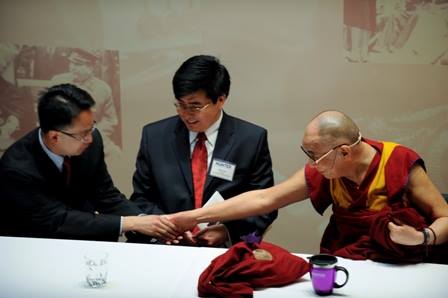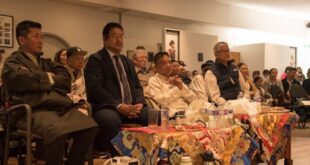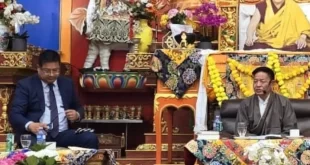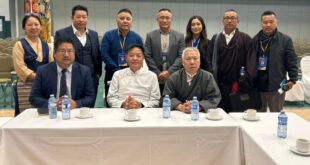by Ming Xia, June 25th, 2017
In response to Haitong Du’s “Opinion: The Dalai Lama’s Commencement Speech Is Problematic for UC San Diego” (The Times of San Diego), I would like to offer my experiences with and views about the Dalai Lama.
I am an educator in the City of New York. I spent my first 26 years in China and the second equal amount of time in the U.S. I am glad to read Haitong Du’s opinion piece because itself, written by an 11th grader in high school, shatters a simplified image of the Chinese students in this country, in Du’s words, “stereotypically politically unaware and culturally inactive.”
Although I grew up in Sichuan province, which has the largest population of Tibetans outside of the Tibetan Autonomous Region, I did not think about the questions under the debate in Du’s piece until I entered post-graduate program in the U.S. I must admit that I had followed the official line of propaganda at its face value, which is reflected in the following two narratives: First, “atrocities committed by the Tibetan regime, including the practice of slavery through 1959” (quote from Du) in Tibet; second, “the Dalai Lama’s character is tarnished” (quote from Du). I must point out that more sinister monikers have been applied by the Chinese officials to the Dalai Lama.
Here I want to point out two facts: First, the atrocities of slavery in Tibet before 1959 were fabricated in the Chinese rhetoric of contrasting the “old” and “new” China as hell and heaven. Anything associated with the “Old Society” such as the Republican years, Chiang Kai-shek and his Nationalist Party, the class of gentry and landlords, and Western Missionaries to China were demonized. The demonization of the Dalai Lama has been just a part of this wide-brushstrokes poster. In his magnum opus A History of Modern Tibet, Melvyn Goldstein (University of California Press, 1989, p. 5) started with a discussion on serfdom in Tibet. He stated, “Tibetan serfs, however, were not necessarily downtrodden, and some serfs…held substantial amounts of land and were quite affluent.” While not justifying serfdom under any circumstances, we should keep in mind that this limited practice was contemporaneous to the atrocities under the World War Two in both Europe and Asia. As the Chinese government has tried to paint Tibetans and its regime as primitive, backward and savage before the Communist take-over, the Dalai Lama personally raised this doubt to me by pointing out that eunuchs among men and feet-binding for women, although were practiced in China for a thousand years, were absent in Tibetan history.
Second, the Chinese official narrative has attempted to tarnish the Dalai Lama’s image by first essentializing his multiple roles as a representative of serfdom and mysterious religion and then demonizing him as a monster. The Dalai Lama as a teacher to his followers, a son and a brother in a nurturing family, a master in Buddhism, a world renowned spiritual leader, and an amiable old man has not been allowed in the Chinese public discourse. Even his portrait is banned in Tibet. In two forums featuring the Dalai Lama at the City University of New York I had the opportunity to meet, touch, and listen to him. He told his audience that he is not a god; he gets sick and has gone through surgery too. I remember at the Deer Park of Madison, Wisconsin, when he was bidding farewell to me and another panelist, he touched my forehead with his and said “Lao Pengyou, Lao Pengyou!” (“Old friend” in Chinese). I can assure my young fellow Chinese that the Dalai Lama does not bite and he has no contagious disease, either. Therefore, it makes no sense to feel frightened by him as well as to spread this fear among other people who know little about the Dalai Lama.
When a teenager is using words such as “ deceptive,” “questionable,” “divisive,” “disappoint and trouble” to denigrate the Dalai Lama and his contribution to the world, I have to point out that the Dalai Lama was only fifteen years old when the Communists invaded Tibet. At age 24 he left Tibet for exile in 1959. On the one hand, it makes no sense to hold him accountable for whatever historical shortcomings in Tibet; on the other hand, during his later decades living in exile, he abolished the old aristocracy, embraced democracy, introduced parliament and free elections, gave up his political power as the old “god-king”. Today he remains as a spiritual leader in tandem with a secular, democratically-elected president (Lobsang Sangay, a Harvard-educated jurist) of the Tibetan Central Administration in Dharamsala, India. Most important of all for people living in the West, the Dalai Lama and his followers have turned Buddhism into part of our mainstream thinking. Because of these achievements, he was awarded the Nobel Prize in Peace in 1989.
I have noticed that the writer of the opinion piece once attended a school for “Ethics and Global Leadership” in Washington, DC. I have to point out that the Dalai Lama has been regarded as a leading voice in global ethics and leadership. I hope that it will not take longer for him to appreciate this sage than it did for me.
Last but not least, as some Chinese students in the U.S. talk about their apolitical attitude, we have to realize that most of them (To be honest, I am included!) are from the elite families in China. What it means is that a status quo politics, namely, through the control of agenda setting to exclude politically challenging issues, is the best exercise of power. Since March 2009 there have been 149 Tibetans (most were monks and nuns, but they also included mothers and teenagers) who died in self-immolation within China. The silence among the global community is deadening. Against such an unprecedented tragedy befalling a persecuted people whose Buddhist beliefs stress compassion and nonviolence, we should not wait to take action and stop it. It is extremely cold-hearted for people to turn away from the most prominent, committed advocate on behalf of Tibetan people and ignore his message.
Ming Xia, Ph.D.
Professor of Political Science and Global Affairs.
The City University of New York the Graduate Center & The College of Staten Island Staten Island, NY 10314




